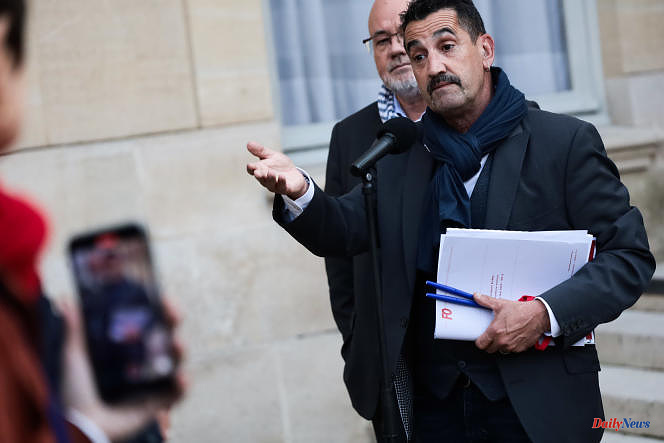One watchword: repeal. A month after the promulgation of the pension reform, Force Ouvrière and the French Democratic Confederation of Labor (CFDT) opened the ball, Tuesday, May 16, new union meetings in Matignon. The inter-union still demands that the government reverse its reform. They have the support of opposition MPs, who intend to challenge the text again, through a bill from the independent group Libertés, Independants, Overseas and Territories (LIOT).
MEPs must examine on June 8 this proposal to repeal the decline in the legal age from 62 to 64 years. But the groups of the presidential majority agreed on Tuesday to use article 40 of the Constitution to raise the financial inadmissibility of the text. A parade intended to prevent the examination of this text.
"Unacceptable", reacted Tuesday Laurent Berger, secretary general of the CFDT. "The maneuvers which would consist in the bill not being examined would still be an additional wedge in a feeling of contempt for us", he judged, at the end of his interview with Elisabeth Borne. He also told the Prime Minister of the "resentment" of employees "fueled by anger" after the pension crisis.
Also on the program of his meeting with the Prime Minister, the many proposals on work contained in an eight-page notebook. The CFDT will "not be satisfied with scoops", he hammered.
"Conditionality" of public aid to businesses
“We were frank, direct on each side of the table. We got the ball rolling but we didn't dance,” said Frédéric Souillot, his Force Ouvrière (FO) counterpart, who presented the Prime Minister with a red badge demanding the “withdrawal” of the reform. "priority" of this union. FO transmitted its arguments on the reform of the pension system to "counter what the President of the Republic had been saying for months [on the fact that] 'no one has made any proposals'".
The two trade unions have raised the issue of wages and called for "conditionality" of public aid paid to companies. FO called for wages to be indexed to inflation, as well as a "thaw of the index point" of civil servants "at the height of inflation", and a "boost to the minimum wage". The CFDT, which supports the idea of wage negotiations, has pleaded for a suspension of exemptions from contributions for branches that have minima below the minimum wage.
After a meeting with the inter-union at the beginning of April which had turned short, Elisabeth Borne, who blew her first candle on Tuesday at Matignon, this time receives each of the five representative organizations, without a specific agenda. She will meet on Wednesday with the French Confederation of Management - General Confederation of Executives (CFE-CGC), the French Confederation of Christian Workers (CFTC), and the General Confederation of Labor (CGT). These meetings are part of the roadmap that Emmanuel Macron entrusted to the Prime Minister to relaunch the executive after the pension crisis.
"The 8 is the last fight"
The unions will then be received "multilaterally" by the end of the month, announced government spokesman Olivier Véran. A proposal rejected for the moment by FO who does not want "no social conference". The "withdrawal of the reform" remains the precondition for future discussions, recalled Frédéric Souillot, also demanding that wages be "linked to inflation". For his part, Laurent Berger judged that it was "too early" to commit to a social agenda.
The Prime Minister proposes to build for a "new pact of life at work", which would be the subject of a bill presented at the end of the year or at the beginning of 2024. The unions must present the 30 May joint proposals on wages, before a 14th day of strike and demonstrations on June 6, two days before the examination of the text of the LIOT deputies.
The intersyndicale on Tuesday launched the website as far as auretrait.fr, to call on parliamentarians to "vote this law", which the government and the majority are trying to defeat. "The 8th is the last fight," CFTC President Cyril Chabanier told Public Senate. "Behind, we go to July-August, it will be complicated to carry out mobilizations".
The employers' organizations, received next week, would have preferred independent negotiations with the unions, which they will see on June 5.












